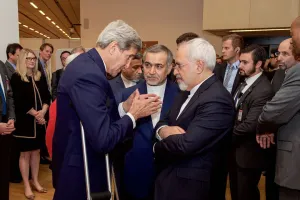American foreign policy is in uncharted waters.
Since the United States emerged as the world’s pre-eminent military and economic power at the end of the Second World War, both of its major political parties confronted the global community in largely the same way. Yes, there were degrees of difference between Democratic and Republican presidents, even between individual executives of the same party, but the nations of the world could largely expect—surely both for good and ill—continuity in policy even as power changed hands.
That’s no longer quite true. Without overstating the case, Donald Trump upended the nation’s approach to foreign policy by withdrawing from a host of agreements and institutions. While many liberals expected Joe Biden to restore America’s reputation of reliability, anyone who’s been paying close attention to American foreign policy over the past year can see that that change hasn’t quite taken place.
A nice example of this shift is evident in the case of America’s 2015 “Iran nuclear deal,” formally known as the Joint Comprehensive Plan of Action (JCPOA). The JCPOA represented a real sea change after decades of hostility between the two countries, involving an American-backed coup against Iran’s democratically elected president in 1953 and the eventual backlash that installed an anti-American Islamic “Republic” in 1979. After almost four decades of hostility, the premise of the deal was remarkably simple; in exchange for abandoning its nuclear weapons program, Iran would see the United States, the United Nations, and the European Union lift crippling economic sanctions.
Some American commentators lambasted the deal at the time, claiming it was effectively a capitulation to Iran. Iran would cheat, they claimed. The measures put in place to monitor Iranian facilities were too lax. Some of the terms of the deal would expire after about ten years, meaning we were kicking the can down the road. Two major US partners in the region, Israel and Saudi Arabia, firmly opposed the JCPOA as well, on similar grounds.
These predictions—although we can’t know exactly what would have happened when certain terms expired—did not come to fruition. Though critics refused to admit it, the enforcement mechanisms in the deal were quite rigorous, and in theory the deal may have had a shot at building some good will and easing aggressive postures.
In 2017, Donald Trump withdrew from the JCPOA and implemented a “maximum pressure” sanctions campaign against Iran. Trump’s tougher line against the country promised to hinder the development of nuclear weapons and inspire popular resistance to the Iranian government, but, instead, we saw the opposite. Soon after the Trump administration’s withdrawal, Iran began enriching uranium past the (very low) threshold permitted by the JCPOA. Moreover, the moderates who negotiated the JCPOA quickly lost support, giving rise to a new hardline government.
After some foot-dragging earlier this year, Joe Biden and his administration are attempting to bring the US back into the Iran deal. But Iranian leaders, whatever we might say about their moral character, are not madmen. They’ve experienced American indecision, and they’re not interested.
The reality American foreign policy makers are dealing with is that even in the case of an agreement as mutually beneficial as the JCPOA, the US simply isn’t credible. There’s no guarantee that Donald Trump or someone who shares his outlook won’t be in office in 2025.
That can’t be extricated from the democratic erosion that’s going on domestically. Even if democracy is, for all intents and purposes, the ruling will of the majority, it nonetheless requires some set of guardrails in the form of basic consensus as to what policies should be pursued or abandoned. Constant ping-ponging between diplomacy and sanctions—between open hands and closed fists—as a result of that consensus collapsing means that neither the United States’ allies nor its enemies have any particular reason to believe that what one administration is saying now will remain true in four years.
This shouldn’t be read as a “both sides” argument. I believe that American foreign policy needs a serious makeover, in a way that generally aligns with political progressivism. But at the same time, any makeover needs to take seriously the fact that a once-stable hegemon is no longer anywhere near as stable as it was, in large part as a result of domestic discontent. Challenges to peace and prosperity around the world are growing, and unless we have clear eyes and stable hands guiding foreign policy, the consequences could be devastating.
Subscribe to Spectacles

Comments
Join the conversation